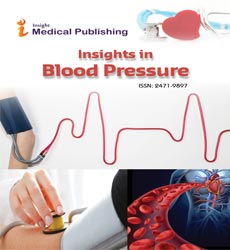Cardiovascular Related Issues in Post Corona Patients
Abdus Samad
Abdus Samad *
Department of Cardiology, Bharati Deemed University Medical College, Pune, India.
- *Corresponding Author:
- Abdus Samad
Department of Cardiology
Bharati Deemed University Medical College
Pune, India.
Received Date: October 09, 2021; Accepted Date: October 14, 2021; Published Date: October 19, 2021
Citation: Samad A (2021) Cardiovascular Related Issues in Post Corona Patients. Insights Blood Press Vol.7 No.5:5
Editorial
The coronavirus disease of 2019 (COVID-19) is caused by the coronavirus 2 that produces severe acute respiratory illness (SARS-CoV-2). In addition to systemic inflammation and pulmonary issues, cardiovascular abnormalities might occur, resulting in significant morbidity and mortality. With almost a year of experience with the COVID-19 (SARS-CoV-2) virus, it has been observed that some COVID-19 (SARS-CoV-2) patients have developed post-COVID symptoms after recovering from the infection, including chronic coughs, cognitive difficulties, and other complaints. These long-haul drivers appeared to have heart problems as well. Determine the long-term implications of coronavirus will likely be one of the most important cardiology problems in 2021. COVID patient cadaver studies also raised concerns regarding long-term heart damage since COVID kills cardiomyocytes.
However, the question of what the long-term ramifications of this cardiac injury will be has been raised. Clinical studies have also revealed a relationship between COVID-19 and cardiovascular disease. Despite the fact that COVID-19 can cause myocardial injury, arrhythmia, and acute coronary syndrome, patients with COVID-19 appear to have worse outcomes and a higher chance of death if they have pre-existing cardiovascular disease.
COVID-19 affects the heart both directly and indirectly. When a virus infects heart cells and causes myocarditis, it causes direct cardiac damage (cell inflammation). This inflammation can be minor to severe, leading in decreased heart function, abnormal heart rhythms, and the possibility of abrupt cardiac death. They use blood testing for cardiac biomarkers, an ECG, and an echocardiography with strain studies to look for signs of heart injury or malfunction.
According to this cardiac work-up, many of these patients have had heart injury as a result of COVID-19 disease. Patients have underlying cardiac damage that is now generating symptoms, even though they test negative for the virus. Electronic cigarettes deliver nicotine without the use of tobacco, and they appear to pose a minor cardiovascular risk in healthy users, at least when smoked for a short time. In China, the death rate from Cardiovascular Diseases (CVD) is rising.
The increased prevalence of Cardiovascular Disease (CVD) has become a serious public health concern in China. Cyanobacteria blooms have recently been discovered as a global environmental issue. The most toxic cyanotoxin found in water bodies is Microcystins (MCs), which are secondary metabolites of cyanobacteria metabolism. Recent research has discovered strong evidence of a relationship between MC exposure and cardiotoxicity, which puts human cardiovascular health at risk.
This review looks at the impact of MCs on the cardiovascular system, including some evidence that CVD can be avoided. This inflammation can be minor to severe, leading in decreased heart function, abnormal heart rhythms, and the possibility of abrupt cardiac death. They use blood testing for cardiac biomarkers, an ECG, and an echocardiography with strain studies to look for signs of heart injury or malfunction. According to this cardiac workup, many of these patients have had heart injury as a result of COVID-19 disease. Patients have underlying cardiac damage that is now causing symptoms, even after testing negative for the virus.
Open Access Journals
- Aquaculture & Veterinary Science
- Chemistry & Chemical Sciences
- Clinical Sciences
- Engineering
- General Science
- Genetics & Molecular Biology
- Health Care & Nursing
- Immunology & Microbiology
- Materials Science
- Mathematics & Physics
- Medical Sciences
- Neurology & Psychiatry
- Oncology & Cancer Science
- Pharmaceutical Sciences
